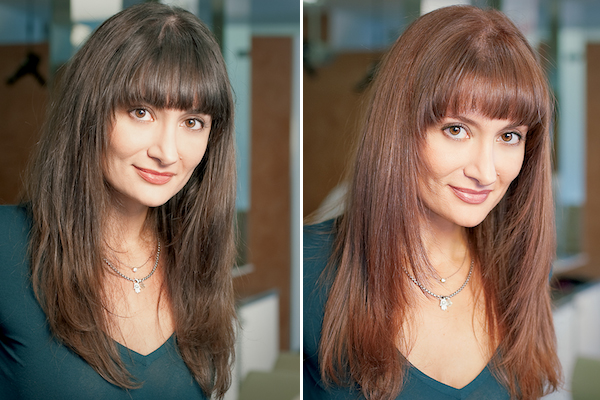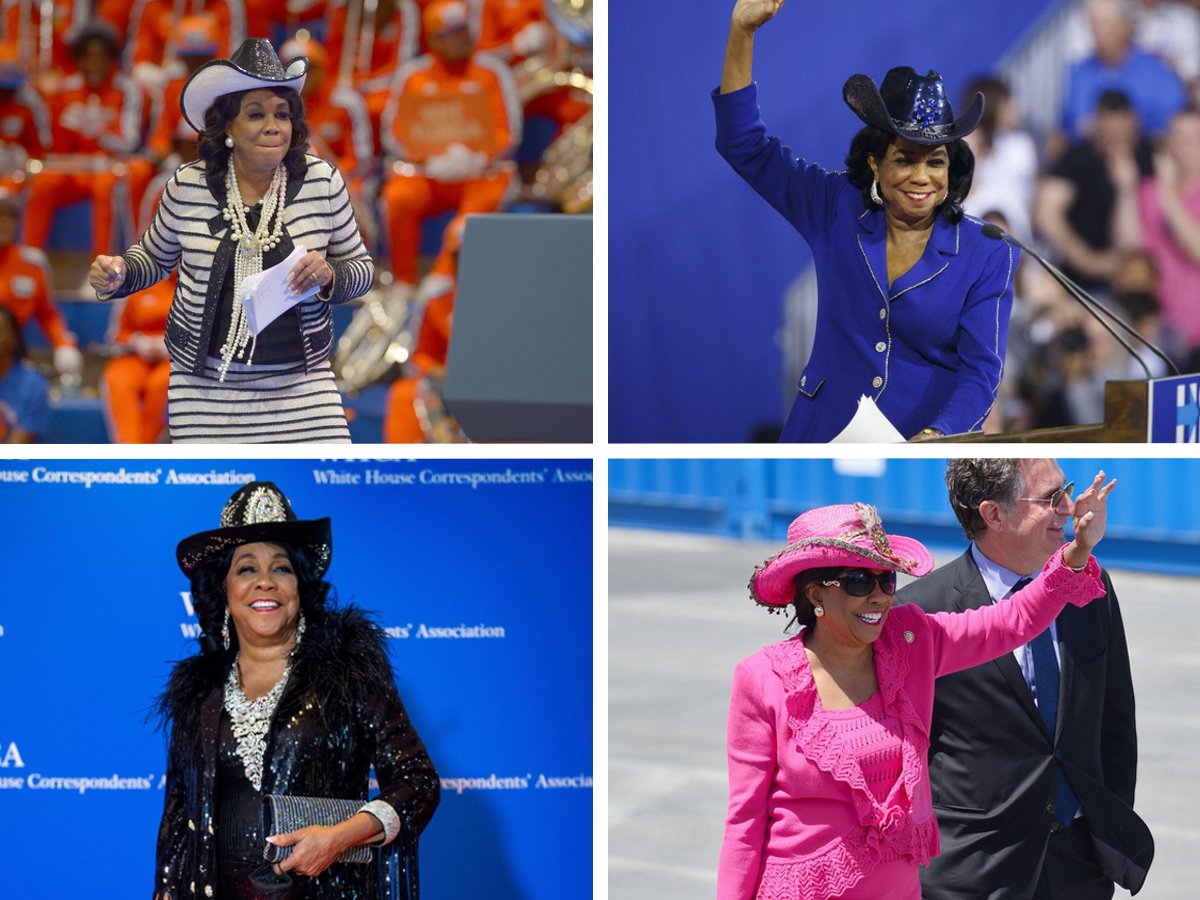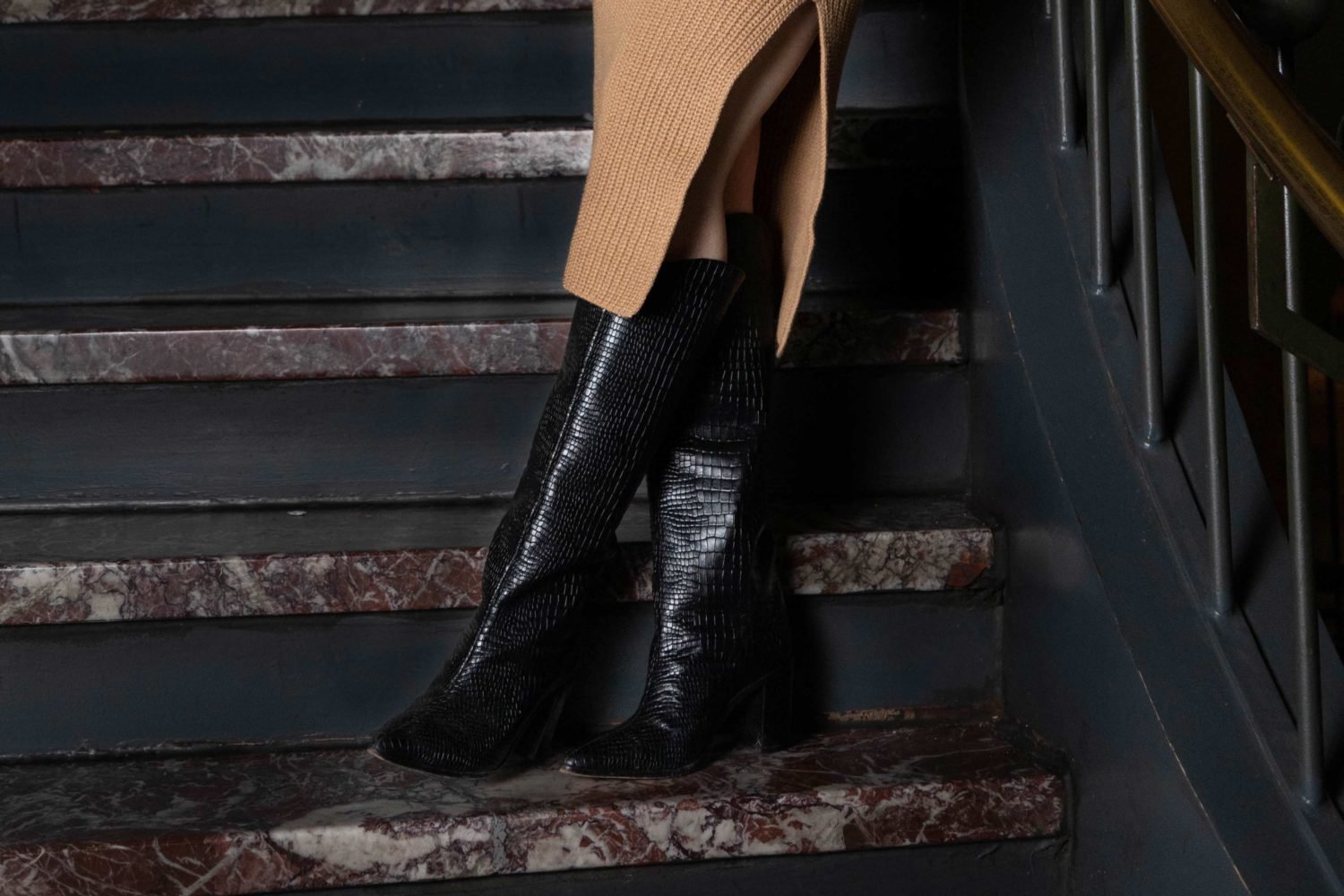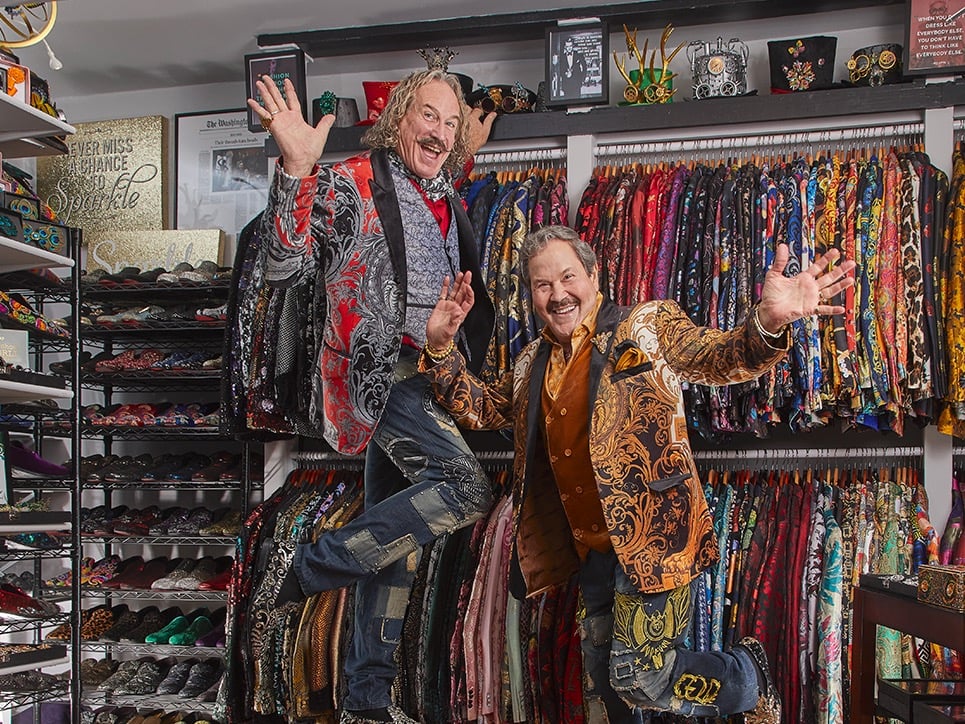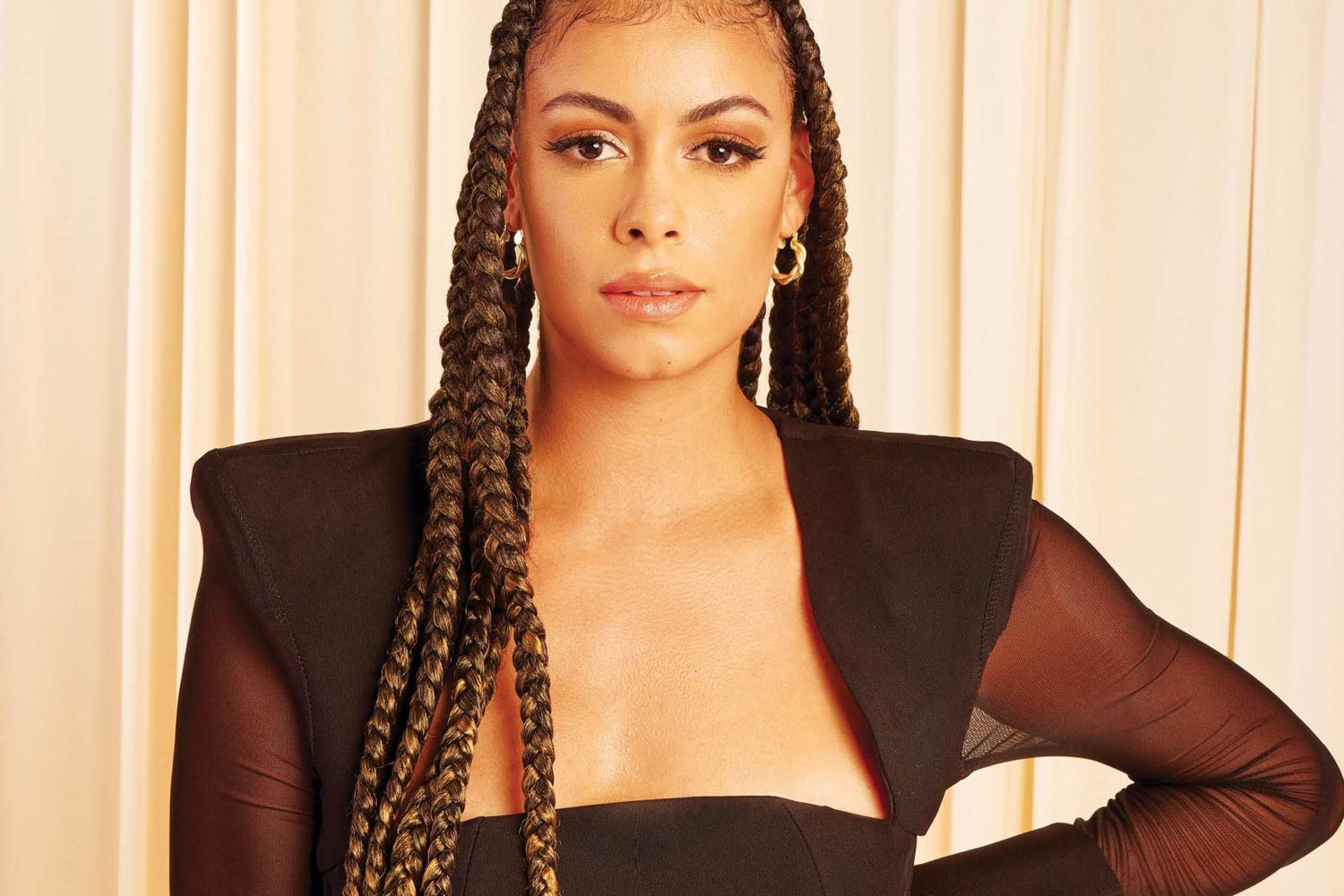The author (above) gives red hair a try, as have such celebrities as Rihanna, Blake Lively, Drew Barrymore, Sharon Osbourne, Jessica Alba, and Emma Stone. Photographs by by Erik Uecke.
As a Russian Jew whose family emigrated to Baltimore, I spent my formative years trapped under a helmet of dark, frizzy curls, fantasizing about being a blonde or a redhead—basically any color that looked lighter, brighter, more dazzling—and more Hollywood than Fiddler on the Roof.
While I spent my tween years heralding the brilliance of Gloria Steinem, the truth is that one of the first women I envied was her polar opposite. It was back when MTV played music, and there in the middle of a Whitesnake video was an image of long, tousled coppery red hair flipping this way and that way as its owner, Tawny Kitaen, did splits and rolled around on top of a Jaguar. To me that fiery hair was it—unapologetic and mesmerizing. This was not the hair of someone who went quietly through life.
Over the next 20 years, I outgrew most of my awkwardness, thanks in no small part to hair-smoothing serums. I embraced the connotations of being a brunette—serious, solid, noncontroversial, sexy in our own dignified, intelligent way (think Salma Hayek), while never elbowing everyone else out of the room for attention (think Jennifer Garner). Brunettes did not do splits on top of sports cars.
But this past year, Tawny’s been on my mind. After all, you couldn’t open a women’s magazine without seeing a photo of Drew Barrymore, Blake Lively, or another celebrity who had gone red, with headlines that screamed: Fiery! Sexy! Hot!
In August, at the height of the British phone-hacking scandal, I stumbled on an article by Robin Givhan about former News of the World editor Rebekah Brooks’s unruly red hair. Was it possible that, in the midst of serious chaos, 900 chastising words were devoted to her ginger locks?
“Hair like [Brooks’s] is a great asset to have in a room crowded with famous and powerful folks,” Givhan wrote. “It makes one immediately memorable without having to utter a single word. . . . That was look-at-me hair—stare at me, remember me. Me, me, me.”
That was the moment I knew I had to have it, the antithesis of my hair. And the antithesis of who I’d always been, and especially what I’d recently become—settled mid-thirties suburbanite and full-time mom to a 19-month-old, a role that couldn’t be further from me, me, me. I was the closet redhead finally ready to come out.
Before I lose my nerve, I book an appointment with one of Washington’s red-hair gurus, Derrick Lachney of One80 Salon in DC. In his previous life as a celebrity colorist in Nashville, he was responsible for singer Naomi Judd’s iconic locks.
“You’ll make a great redhead,” he assures me. “It’s much easier for a brunette to go red since you already have the warmth in your hair and skin.”
I’m sold, but my husband is nervous. He’s seen some of my flashier relatives transform their perfectly lovely dark hair into a violet-red hue so bright and artificial it looks radioactive. So I’m grateful when Derrick recommends a natural coppery, multi-toned shade.
“He’ll love it,” Derrick says. “I have a newlywed who went red a year ago and never went back. What husband doesn’t want to feel like he’s married to a new woman?”
As he lightens my ends and darkens my roots to avoid the telltale signs of a bad dye job—fluorescent roots and hair that’s one flat, solid mass of rouge—one of the owners chimes in: “You know how blondes have more fun? Well, redheads do what blondes only dream of.”
Having never experienced life as anything other than a brunette, I’m not sure what that means. But he’s not the only one who feels that way.
Historically, red hair was thought to be a mark of moral degeneration. As recently as 2006, a German study comparing the sex lives of women based on their hair color found that redheads were more active. The study also showed that women who change their hair color to red were sending a message that they were on the prowl, and those who did so while in a relationship were subliminally communicating to their partners that they were unhappy and looking for something better. That might explain my husband’s apprehension.
But does hair influence your personality? Or is it that personality matches the hair you have—whether you’re born with it or not?
After four hours in the salon, during which the stylist eliminated all signs of my former brownness (including dying my brows), I look in the mirror and am disarmed by what I see. The color is gorgeous, though I alternate between feeling like a doll and like someone on her way to work at a gentleman’s club—albeit a high-end one.
“It’s like slipping on a pair of stilettos for the first time, isn’t it?” my friend Kelly asks when I meet her for dinner that night. She’s a natural blonde who went red a few years ago.
“It is,” I agree. As a high-heel collector, I recognize that my new hue has changed my gait in the same way my beloved shoes do—head up, shoulders back—as if my hair now demands being carried on a pedestal.
“It makes people do a double take,” Kelly says. “Men, women—it doesn’t matter. People see red and they think you’re wild, but also weirdly innocent at the same time. Sexy without being a bimbo.”
But not effortlessly sexy, I reply. When you lack anything remotely resembling a freckle, it’s obvious that your billowing bronze mane is a calculated decision as opposed to a genetic blessing. The thing about being a brunette is that you never look like you’re trying to stand out, or worse—trying too hard.
“Then throw away all your stilettos,” she says. “Because there’s no pair of four-inch heels that make you look effortless, either.”
I keep that in mind as I head home for the night. The parking attendant who saw me pre-makeover smiles and says: “You change your hair? Very nice.”
The attention doesn’t stop there, though some of the second glances are those I give myself. It’s hard to get used to looking down at the hair that falls below my shoulders and seeing a color that doesn’t belong on my head, and I have several moments in which I’m convinced that people think I’m wearing a wig. But when I get home, I sigh in relief.
“It looks good,” my husband says. “Better than I thought it would—like it’s still you.”
Even so, I can tell he misses the dark curls that defined me for so many years. We never speak of my brazen new hair color again.
“You look gorrrggeous!” purrs my mother, who even in her sixties looks and sounds like she should be a Bond girl. As the epitome of old-school Russian glamour, she shuns the concept of effortless beauty, believing it’s just a nice way to forgive your own laziness. I can tell it warms her heart to have me look like I spent a lot of time and money on myself.
“I was dyeing my hair red when I met your father, like Rita Hayworth,” she says. “There’s just something about redheads.”
She seems to be right. The next day, my shopping trip through Wegmans is interrupted by a woman who can’t stop gushing about my “beautiful hair.” Another woman approaches me at Baby Gap, and while my toddler oohs and aahs at her younger baby, she asks where I get my hair done. I can tell she’s skirting the real question on her mind, so I reward her politeness with the truth.
“It’s nowhere close to my natural color,” I confide, setting off a ten-minute conversation about how frumpy she’s been feeling, how much weight she still has to lose, and ho
w she’s never felt in greater need of a beauty boost. It occurs to me that hair is one of the few things that can make you feel good even when every article of clothing in your closet seems to be waging a war against your self-esteem.
That night, I post a picture of my new do on Facebook and immediately get 11 “likes” and 30 comments with multiple mentions of Wow! Hot! Sassy! Sexy! Fabulous! For a second, I wonder if they’re responding to the right post.
“It’s nice, but I’m obligated to say leave it to the naturals,” writes my friend Matthew, who’s married to a born redhead. I wonder how the 1 or 2 percent of the population who are naturally red feel now that their color is having a fashion moment.
“It’s ironic,” says Megan, who belongs to that percentage. “When I was little, I hated it. Being different meant being picked on. Then you get older and you hear the stereotypes about being mean-spirited or evil or shifty. Or worse, crazy. And now suddenly it’s the color everyone wants to be—you can dye your hair and reap the benefits of being red now that it’s a good thing, without having ever suffered the downside.”
It never dawned on me that hair color could be teeming with such irony and strife. But within weeks of my conversation with her, just as Derrick is telling me that his weekends are more jam-packed with redhead appointments than ever, the largest sperm bank in the world announces that it’s rejecting redhead donors because there isn’t much demand for babies with red hair.
Apparently, in a world of largely dark-haired people, the desired effect is a child who blends in with his or her parents—even if that kid goes on to spend lots of time and money to stand out in the crowd 30 years later.
This article appears in the December 2011 issue of The Washingtonian.

